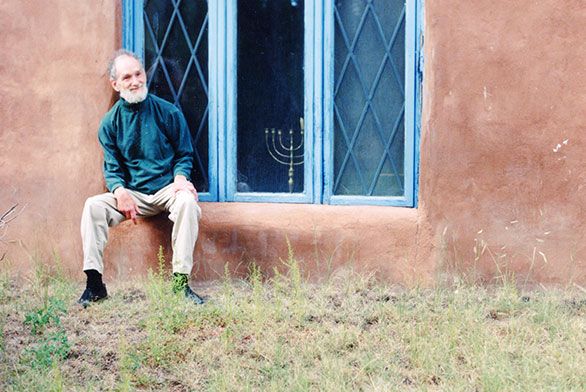A 70-Year Legacy: Celebrating Santa Fe Tutor Emeritus Robert Sacks
December 18, 2023 | By Salomon Cordova (SF22)
In a poignant gathering earlier this year, the St. John’s Santa Fe community convened within the Great Hall to pay homage to tutor emeritus Robert “Bob” Sacks, the college’s longest-serving faculty member who is also an alum. (Sacks graduated from the Annapolis campus in 1954.) The event, “On the Biblical, Geometrical, Political Mind: A Panel in Honor of Bob Sacks,” recognized his invaluable contributions to the college’s living traditions and celebrated his book Three Wells, a collection of his writings brought to fruition by tutors Janet Dougherty, Phil LeCuyer, J. Walter Sterling, and Howard Fisher and published by Respondeo Books.

Born in Akron, Ohio, in 1931, Sacks faced challenges living with cerebral palsy. At a time when many children with such conditions were confined to institutions, Sacks’ parents championed both his mental and physical development. Their support enabled him to start speaking at the age of two, even though, according to Sacks, it took considerably longer for those around him to discern the rudimentary forms of speech he was producing.
Sacks’ search for a college where his cerebral palsy would not impede his quest for knowledge led him to St. John’s in Annapolis. There, he got to know tutor and philosopher Jacob Klein, who would go on to become the colleges dean and counted among his mentors the eminent philosophers Edmund Husserl and Martin Heidegger. After Sacks graduated, Klein facilitated his introduction to another influential tutor, the political theorist Leo Strauss, under whose mentorship Sacks would go on to study in Jerusalem. Klein and Strauss played pivotal roles in shaping not only the college’s educational curriculum but also Sacks’ personal scholarship. “Klein gave me insight into what constitutes a great book, while Strauss helped me learn how to read a great book,” reflects Sacks. These skills would prove invaluable when he became a faculty member at St. John’s College in 1961, initially teaching in Annapolis before moving to Santa Fe.
Sacks’ approach to reading, which is characterized by a profound engagement with texts, mirrors the essence of the St. John’s Program. Former Santa Fe dean Sterling aptly observed in the panel’s introduction that no one embodies this style more than Sacks. It is a style deeply rooted in the ages-old project of desedimentation, roughly defined as returning to the primary inquiries and reflections of Athens and Jerusalem’s philosophers—a project Sacks inherited from Klein, who, in turn, inherited it from Heidegger.
Santa Fe tutor Dougherty captures this project of desedimentation in her introduction to Three Wells. In it, she underscores the enduring challenge of preventing the reduction of individual knowledge to mere prejudices, dogmas, thoughtless habits of speech, and implicit claims—a challenge that remains both a formidable obstacle to and a catalyst for true learning. Sacks’ writing bears witness to this project, standing as a testament to his mission of preserving the purity of original thought amidst the noise of opinion. “Bob is a writer who makes you engage in a reading beyond your own idiosyncrasies and inquire into your own soul,” Dougherty asserts.
Watch “On the Biblical, Geometrical, Political Mind: A Panel in Honor of Bob Sacks.”

